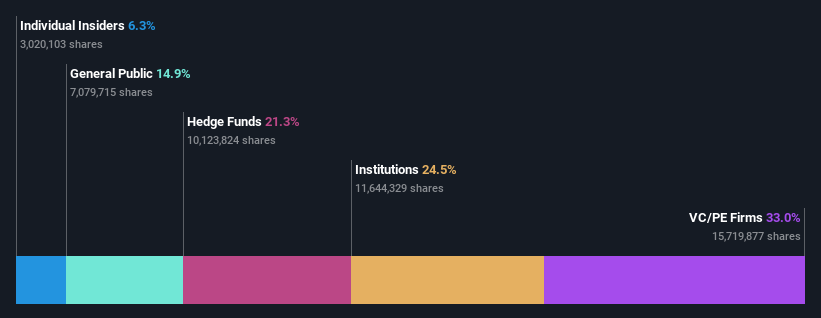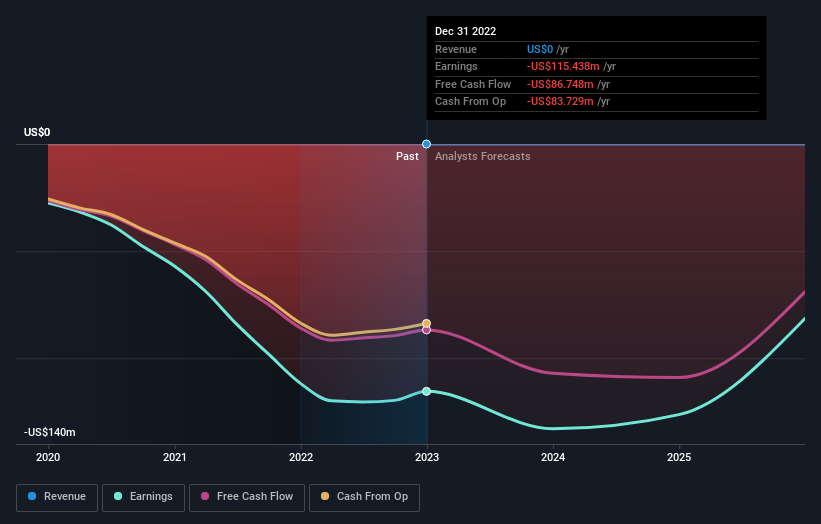- United States
- /
- Biotech
- /
- NasdaqGS:PRLD
Institutions profited after Prelude Therapeutics Incorporated's (NASDAQ:PRLD) market cap rose US$35m last week butprivate equity firms profited the most

Key Insights
- Significant control over Prelude Therapeutics by private equity firms implies that the general public has more power to influence management and governance-related decisions
- A total of 2 investors have a majority stake in the company with 54% ownership
- Recent purchases by insiders
To get a sense of who is truly in control of Prelude Therapeutics Incorporated (NASDAQ:PRLD), it is important to understand the ownership structure of the business. The group holding the most number of shares in the company, around 33% to be precise, is private equity firms. That is, the group stands to benefit the most if the stock rises (or lose the most if there is a downturn).
Following a 12% increase in the stock price last week, private equity firms profited the most, but institutions who own 24% stock also stood to gain from the increase.
Let's delve deeper into each type of owner of Prelude Therapeutics, beginning with the chart below.
See our latest analysis for Prelude Therapeutics

What Does The Institutional Ownership Tell Us About Prelude Therapeutics?
Many institutions measure their performance against an index that approximates the local market. So they usually pay more attention to companies that are included in major indices.
Prelude Therapeutics already has institutions on the share registry. Indeed, they own a respectable stake in the company. This can indicate that the company has a certain degree of credibility in the investment community. However, it is best to be wary of relying on the supposed validation that comes with institutional investors. They too, get it wrong sometimes. It is not uncommon to see a big share price drop if two large institutional investors try to sell out of a stock at the same time. So it is worth checking the past earnings trajectory of Prelude Therapeutics, (below). Of course, keep in mind that there are other factors to consider, too.

It looks like hedge funds own 21% of Prelude Therapeutics shares. That's interesting, because hedge funds can be quite active and activist. Many look for medium term catalysts that will drive the share price higher. OrbiMed Advisors LLC is currently the largest shareholder, with 33% of shares outstanding. Baker Bros. Advisors LP is the second largest shareholder owning 21% of common stock, and FMR LLC holds about 9.6% of the company stock. Additionally, the company's CEO Krishna Vaddi directly holds 4.5% of the total shares outstanding.
A more detailed study of the shareholder registry showed us that 2 of the top shareholders have a considerable amount of ownership in the company, via their 54% stake.
Researching institutional ownership is a good way to gauge and filter a stock's expected performance. The same can be achieved by studying analyst sentiments. While there is some analyst coverage, the company is probably not widely covered. So it could gain more attention, down the track.
Insider Ownership Of Prelude Therapeutics
The definition of company insiders can be subjective and does vary between jurisdictions. Our data reflects individual insiders, capturing board members at the very least. The company management answer to the board and the latter should represent the interests of shareholders. Notably, sometimes top-level managers are on the board themselves.
Most consider insider ownership a positive because it can indicate the board is well aligned with other shareholders. However, on some occasions too much power is concentrated within this group.
We can see that insiders own shares in Prelude Therapeutics Incorporated. It has a market capitalization of just US$322m, and insiders have US$20m worth of shares, in their own names. This shows at least some alignment. You can click here to see if those insiders have been buying or selling.
General Public Ownership
The general public, who are usually individual investors, hold a 15% stake in Prelude Therapeutics. While this size of ownership may not be enough to sway a policy decision in their favour, they can still make a collective impact on company policies.
Private Equity Ownership
Private equity firms hold a 33% stake in Prelude Therapeutics. This suggests they can be influential in key policy decisions. Some investors might be encouraged by this, since private equity are sometimes able to encourage strategies that help the market see the value in the company. Alternatively, those holders might be exiting the investment after taking it public.
Next Steps:
While it is well worth considering the different groups that own a company, there are other factors that are even more important. For example, we've discovered 3 warning signs for Prelude Therapeutics (1 makes us a bit uncomfortable!) that you should be aware of before investing here.
But ultimately it is the future, not the past, that will determine how well the owners of this business will do. Therefore we think it advisable to take a look at this free report showing whether analysts are predicting a brighter future.
NB: Figures in this article are calculated using data from the last twelve months, which refer to the 12-month period ending on the last date of the month the financial statement is dated. This may not be consistent with full year annual report figures.
If you're looking to trade Prelude Therapeutics, open an account with the lowest-cost platform trusted by professionals, Interactive Brokers.
With clients in over 200 countries and territories, and access to 160 markets, IBKR lets you trade stocks, options, futures, forex, bonds and funds from a single integrated account.
Enjoy no hidden fees, no account minimums, and FX conversion rates as low as 0.03%, far better than what most brokers offer.
Sponsored ContentNew: Manage All Your Stock Portfolios in One Place
We've created the ultimate portfolio companion for stock investors, and it's free.
• Connect an unlimited number of Portfolios and see your total in one currency
• Be alerted to new Warning Signs or Risks via email or mobile
• Track the Fair Value of your stocks
Have feedback on this article? Concerned about the content? Get in touch with us directly. Alternatively, email editorial-team (at) simplywallst.com.
This article by Simply Wall St is general in nature. We provide commentary based on historical data and analyst forecasts only using an unbiased methodology and our articles are not intended to be financial advice. It does not constitute a recommendation to buy or sell any stock, and does not take account of your objectives, or your financial situation. We aim to bring you long-term focused analysis driven by fundamental data. Note that our analysis may not factor in the latest price-sensitive company announcements or qualitative material. Simply Wall St has no position in any stocks mentioned.
About NasdaqGS:PRLD
Prelude Therapeutics
A clinical-stage precision oncology company, focuses on the discovery and development of novel precision cancer medicines to underserved patients.
Moderate with adequate balance sheet.
Market Insights
Community Narratives




